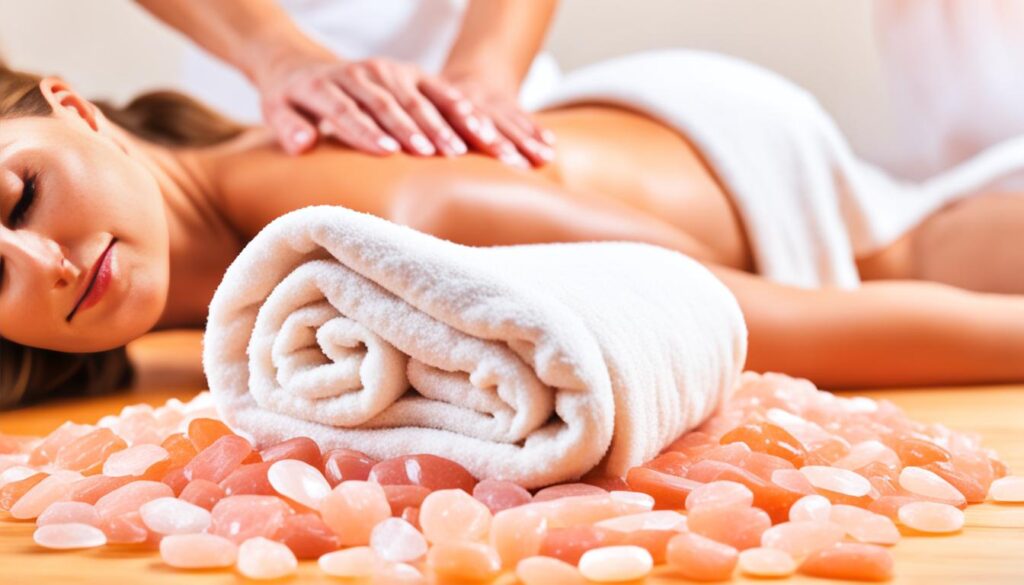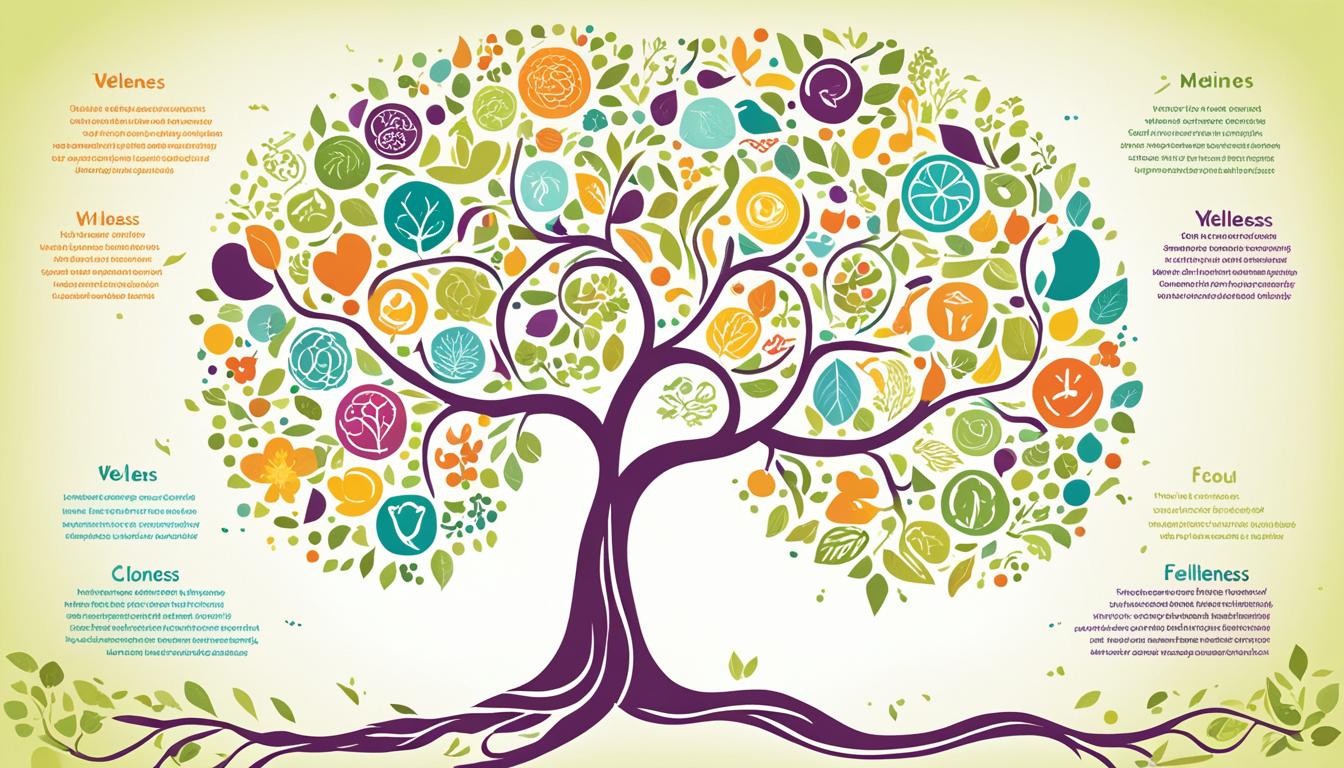In today’s fast-paced world, where stress and anxiety have become commonplace, it has become more important than ever to prioritize our well-being. One powerful tool that can help us achieve optimal well-being is wellness education. With a focus on holistic wellness, wellness coaching, mental health education, and self-care education, wellness education provides us with the knowledge and tools to take care of our mind, body, and soul.
Key Takeaways:
- Wellness education is a transformative tool that can help us achieve optimal well-being.
- It focuses on holistic wellness, including the mind, body, and soul.
- Wellness coaching empowers individuals to make positive changes in their lives.
- Mental health education teaches us how to prioritize our mental well-being.
- Self-care education provides us with the knowledge and skills to take care of ourselves.
The Interconnectedness of Mental and Physical Health
In today’s fast-paced world, it’s crucial to recognize the intrinsic link between mental and physical health. The mind and body are interconnected, and taking care of one aspect directly impacts the other. This section will explore the profound significance of this connection and highlight the importance of somatic healing in achieving overall well-being.
Understanding Somatic Healing
Somatic healing is an approach that recognizes the mind-body connection and emphasizes the importance of addressing physical symptoms from a holistic perspective. It involves understanding how emotional stress, trauma, or negative experiences can manifest as physical ailments or pain. By addressing the underlying emotional factors and releasing tension from the body, somatic healing promotes healing on both the mental and physical levels.
Impact of Mental Well-being on Physical Health
Mental well-being plays a pivotal role in physical health. When we prioritize our mental health and nurture our emotional state, we experience numerous benefits physically. Studies have shown that reduced stress, anxiety, and depression levels are associated with improved cardiovascular health, enhanced immune system function, and better overall physical well-being. Taking care of our mental health positively impacts our physical health, allowing us to lead healthier and more fulfilling lives.
Mental Health as a Pillar of Holistic Wellness
Mental health forms a fundamental pillar of holistic wellness. It is impossible to achieve true well-being without addressing our mental and emotional needs. By prioritizing mental health through practices like mindfulness, therapy, and self-reflection, we create a solid foundation for all other aspects of our well-being. When our mental health is nourished, we are better equipped to face the challenges of life, maintain healthy relationships, and experience a sense of fulfillment and purpose.
| Benefits of Recognizing the Interconnectedness of Mental and Physical Health | Examples |
|---|---|
| Improved overall well-being | Reduced stress levels |
| Enhanced physical health | Increased immune system function |
| Increased resilience | Improved cardiovascular health |
| Greater emotional well-being | Reduced risk of chronic illnesses |
Embracing Self-Love Through Wellness Practices
Self-love is a fundamental aspect of overall well-being and plays a crucial role in our journey towards a positive and fulfilling life. By prioritizing self-care and practicing self-compassion, we can enhance our emotional, physical, and mental well-being while cultivating a deeper sense of self-love.
When we engage in wellness practices that nurture our bodies, minds, and souls, we are actively showing ourselves kindness, compassion, and love. By making time for activities and rituals that promote self-care, such as exercise, meditation, and healthy eating, we are prioritizing our well-being and acknowledging our worth.
Wellness practices are not only beneficial for our physical health but also have a profound impact on our mental and emotional well-being. By taking care of ourselves holistically, we are better equipped to navigate life’s challenges, manage stress, and cultivate a positive mindset.
“Self-love, self-respect, self-worth: There’s a reason they all start with ‘self.’ You can’t find them in anyone else.” – Unknown
By embracing self-love through wellness practices, we can break free from negative self-talk, self-doubt, and feelings of inadequacy. Instead, we can foster a deep sense of self-acceptance, self-empowerment, and self-compassion. These practices allow us to connect with ourselves on a deeper level, honoring our needs, dreams, and desires.
Remember, self-love is not a one-time event but an ongoing journey. It requires patience, consistency, and a commitment to prioritize our well-being. As we cultivate self-love through wellness practices, we nourish our minds, bodies, and souls, paving the way for a more fulfilling and authentic life.
The Role of Physical Activity in Mental Clarity
Incorporating physical activity into our daily routines is not only beneficial for our physical health but also plays a crucial role in promoting mental clarity. Exercise has been shown to have a positive impact on reducing stress and anxiety, while also enhancing self-esteem. By engaging in regular exercise, we can improve our mental well-being and achieve greater clarity of mind.
Movement for Stress and Anxiety Reduction
One of the significant benefits of physical activity is its ability to reduce stress and anxiety. When we exercise, our bodies release endorphins, which are natural mood-boosting chemicals. These endorphins help alleviate stress, promote relaxation, and reduce anxiety levels. Whether it’s going for a run, practicing yoga, or participating in a team sport, movement can be an effective tool for managing stress and maintaining emotional well-being.
Enhancing Self-Esteem Through Exercise
Regular exercise can also have a profound impact on our self-esteem. When we engage in physical activity, we challenge ourselves, set goals, and achieve them. This sense of achievement can significantly boost our self-confidence and improve our overall self-esteem. Additionally, exercise promotes a positive body image and improves body satisfaction, further enhancing our self-perception and self-worth.
By focusing on our physical health through exercise, we not only improve our physical well-being but also enhance our mental clarity, reduce stress and anxiety, and boost our self-esteem.

| Benefits of Physical Activity for Mental Clarity |
|---|
| Reduces stress levels |
| Alleviates anxiety |
| Boosts self-esteem and confidence |
| Promotes relaxation |
| Improves overall well-being |
Optimizing Sleep for Emotional and Mental Balance
In order to achieve emotional balance and maintain mental well-being, optimizing sleep is crucial. Cultivating healthy sleep habits can greatly contribute to improving emotional well-being and enhancing mental balance. Furthermore, the quality of sleep has a direct impact on mental health.
Cultivating Healthy Sleep Habits
Developing healthy sleep habits is essential for optimizing sleep and promoting emotional and mental balance. Here are some key steps you can take to establish healthy sleep habits:
- Create a bedtime routine: Establishing a consistent bedtime routine can signal to your body that it’s time to relax and prepare for sleep.
- Avoid electronics before bed: The blue light emitted by electronic devices can disrupt your sleep cycle. Limit your screen time before bed to promote better sleep.
- Create a sleep-friendly environment: Make sure your bedroom is quiet, dark, and at a comfortable temperature to create an optimal sleep environment.
- Avoid caffeine and heavy meals before bed: Consuming caffeine and eating heavy meals close to bedtime can interfere with your ability to fall asleep and have restful sleep throughout the night.
Connecting Sleep Quality and Mental Health
The connection between sleep quality and mental health is profound. Poor sleep can have a significant impact on your emotional well-being and overall mental balance. Lack of sleep or disrupted sleep can lead to increased stress, anxiety, irritability, and difficulty concentrating.
On the other hand, prioritizing healthy sleep habits and ensuring adequate sleep can improve emotional regulation, enhance cognitive function, and promote overall mental well-being. Getting restful and rejuvenating sleep enables you to better cope with daily challenges and maintain emotional balance.
Wellness Education
In today’s fast-paced world, prioritizing our well-being is more important than ever. Wellness education plays a vital role in empowering individuals to take charge of their health and live a balanced life. By expanding knowledge and acquiring valuable skills, individuals can make informed choices and implement effective strategies for enhancing overall well-being.
Extending Knowledge: Wellness Workshops and Courses
Wellness workshops and courses provide invaluable opportunities for individuals to deepen their understanding of wellness and explore various techniques for self-care. These educational experiences offer a structured environment where participants can learn from experts in the field and connect with like-minded individuals on a similar wellness journey. Workshops and courses cover a wide range of topics, including nutrition, stress management, mindfulness, and holistic healing. By actively engaging in wellness workshops and courses, individuals can gain practical knowledge and develop essential skills to improve their physical, mental, and emotional well-being.
Professional Development in Wellness Techniques
Professional development is a key aspect of wellness education, enabling individuals to enhance their expertise in specific wellness techniques. Professionals in various fields, such as wellness coaching, massage therapy, or yoga instruction, can benefit from ongoing education and training to stay current with the latest advancements in their respective fields. By investing in professional development, individuals can deepen their understanding of wellness principles and techniques, refine their skills, and provide high-quality wellness services to their clients. This continuous learning process empowers professionals to offer tailored support and guidance to help individuals achieve their wellness goals.

| Wellness Education Benefits | Wellness Workshops | Wellness Courses | Professional Development |
|---|---|---|---|
| Deepens knowledge and understanding | ✔ | ✔ | ✔ |
| Enhances skills and techniques | ✔ | ✔ | ✔ |
| Connects with like-minded individuals | ✔ | ✔ | ✔ |
| Keeps professionals up-to-date | ✔ |
Table: Comparison of Benefits in Wellness Education
Nourishing the Mind with Mindfulness Practices
In this section, we will delve into the practice of mindfulness and its nourishing effects on the mind. Mindfulness practices have gained significant popularity in recent years as people seek ways to promote mental well-being and find inner peace. By incorporating mindfulness into daily life, individuals can nurture their minds and achieve greater overall well-being.
Mindfulness involves paying attention to the present moment without judgment, allowing individuals to fully experience their thoughts, emotions, and physical sensations. The practice cultivates a state of heightened awareness and acceptance, enabling individuals to respond to life’s challenges with clarity and equanimity.
Here are some mindfulness techniques that can help nourish the mind:
- Meditation: Engaging in regular meditation practices, such as mindfulness meditation, can calm the mind, reduce stress, and enhance self-awareness.
- Deep Breathing: Taking slow, deep breaths can activate the body’s relaxation response, promoting a sense of calm and reducing anxiety.
- Body Scan: A body scan meditation involves bringing attention to different parts of the body, noticing any sensations or tensions, and fostering a sense of relaxation and presence.
- Walking Meditation: Integrating mindfulness into daily walks can help individuals become more aware of their surroundings, engage the senses, and cultivate a sense of purpose and appreciation.
- Gratitude Practice: Cultivating gratitude through mindful reflection on the positive aspects of life can shift focus away from negativity and foster a more positive mindset.
By regularly practicing mindfulness techniques, individuals can nourish their minds, reduce stress, improve focus, and enhance overall well-being. It is important to approach mindfulness with an open mind and maintain consistency in the practice for optimal results.
| Mindfulness Practice | Benefits |
|---|---|
| Meditation | • Calms the mind • Reduces stress • Enhances self-awareness |
| Deep Breathing | • Promotes relaxation • Reduces anxiety • Brings a sense of calm |
| Body Scan | • Fosters relaxation • Increases body awareness • Enhances presence |
| Walking Meditation | • Engages the senses • Cultivates purpose • Increases mindfulness in daily life |
| Gratitude Practice | • Shifts focus to positivity • Cultivates a positive mindset • Increases overall well-being |
Integrating mindfulness practices into daily routines can have a profound impact on mental well-being. By nourishing the mind with mindfulness, individuals can cultivate a greater sense of peace, clarity, and resilience, leading to a more fulfilling and balanced life.
Strengthening Relationships for Emotional Wellness
In order to achieve emotional wellness, it is essential to recognize the significance of strong relationships in our lives. Fostering community support and establishing meaningful social bonds play a crucial role in promoting mental health and overall well-being. By cultivating connections and seeking support from those around us, we can enhance our emotional well-being and nurture positive mental health.
Fostering Community Support
Building a sense of community support is key to creating a network of individuals who can provide encouragement, understanding, and guidance. By engaging with others who share similar interests or face similar challenges, we can establish connections that foster emotional well-being. Participating in community activities, volunteering for local causes, or joining support groups are effective ways to foster community support and cultivate a sense of belonging.
Importance of Social Bonds in Mental Health
Social bonds play a vital role in maintaining and improving mental health. Strong relationships with family, friends, and loved ones provide emotional support, create a sense of belonging, and offer opportunities for meaningful connection. Research has shown that individuals with strong social bonds are more likely to experience lower levels of stress, anxiety, and depression. These positive relationships also provide a support system during times of adversity and can contribute to improved overall well-being.

By prioritizing and nurturing our relationships, we can fortify emotional wellness and develop a strong support system. The image above represents the power of community support and highlights the importance of coming together to promote mental health and well-being. Through meaningful connections and a sense of belonging, we can navigate life’s challenges with resilience and enjoy enhanced emotional wellness.
| Benefits of Strengthening Relationships |
|---|
| Enhanced emotional well-being |
| Reduced stress, anxiety, and depression levels |
| Improved overall mental health |
| Greater resilience in the face of adversity |
| Increased feelings of belonging and support |
Specialized Wellness Strategies: Focused Education for Targeted Needs
In the world of wellness, there is a growing recognition of the need for specialized strategies that provide targeted education to meet specific needs. These tailored approaches to wellness empower individuals to address their unique challenges and achieve optimal well-being.
Himalayan Salt Stone Massage and Its Benefits
One such specialized wellness strategy is the Himalayan salt stone massage. This unique massage technique involves the use of heated salt stones to provide a deeply relaxing and therapeutic experience. The salt stones, sourced from the Himalayan mountains, are known for their rich mineral content, which has a multitude of benefits for the body and mind.
During a Himalayan salt stone massage, the warm stones are gently glided over the body, releasing negative ions that help reduce stress, improve sleep, and enhance overall well-being. The minerals present in the salt stones promote detoxification and stimulate circulation, leaving you feeling rejuvenated and revitalized.

Educational Insights Into Prenatal Massage Care
Prenatal massage is another specialized wellness strategy that focuses on the unique needs of expectant mothers. This form of massage is specifically designed to alleviate discomfort, reduce stress, and promote a sense of well-being during pregnancy.
With targeted education on prenatal massage care, trained therapists can provide expectant mothers with a safe and effective massage experience. Prenatal massage techniques are adapted to accommodate the changing needs of the body during pregnancy, helping to relieve common pregnancy-related discomforts such as back pain, swollen ankles, and fatigue.
Empowering Cancer Care with Lymphatic Education
Cancer care requires a comprehensive approach that addresses both the physical and emotional aspects of the disease. Lymphatic education plays a vital role in empowering individuals to manage the effects of cancer and its treatment.
By providing targeted education on lymphatic system function and techniques for lymphatic drainage, individuals affected by cancer can take an active role in their own care. Lymphatic education helps reduce swelling, promote detoxification, and support the immune system, resulting in improved overall well-being and quality of life.
Specialized wellness strategies, such as Himalayan salt stone massage, prenatal massage care, and lymphatic education, offer individuals targeted education and unique approaches to wellness. These strategies empower individuals to address their specific needs, promoting overall well-being and enabling them to live their best lives.
Conclusion
In conclusion, integrating wellness education into daily life is crucial for personal growth and the journey to wellness. By embracing the principles of wellness education and applying them in our daily routines, we can experience transformative changes and achieve optimal well-being.
Integrating Wellness Education into Daily Life
Integrating wellness education into daily life means consciously incorporating wellness practices and techniques into our routines. It involves making informed choices about our physical and mental well-being, and actively seeking opportunities for growth and self-improvement.
By incorporating wellness education into our daily lives, we can develop healthier habits, manage stress more effectively, and enhance our overall quality of life. From practicing mindfulness and self-care to engaging in regular physical activity and prioritizing sleep, integrating wellness education empowers us to make positive changes and nurture our well-being.
Personal Growth and the Journey to Wellness
The integration of wellness education into daily life is not just about physical well-being; it also fosters personal growth on a holistic level. As we embrace wellness education and apply its principles, we embark on a transformative journey towards self-discovery, self-improvement, and self-empowerment.
By nurturing our mental and emotional well-being, we can develop resilience, enhance our relationships, and cultivate a sense of purpose and fulfillment. As we prioritize our well-being and commit to lifelong learning, we unlock our full potential and create a foundation for personal growth and holistic wellness.
In conclusion, integrating wellness education into daily life is not a one-time achievement but a continuous process that requires commitment and dedication. By embracing wellness education and incorporating it into our routines, we embark on a journey of personal growth that encompasses our physical, mental, and emotional well-being. Let us seize the opportunity to transform our lives and achieve optimal wellness.
FAQ
What is holistic wellness education?
Holistic wellness education is an educational approach that focuses on addressing the mind, body, and soul to achieve overall well-being. It emphasizes the interconnectedness of various aspects of health and provides guidance on lifestyle choices, self-care practices, and mental health techniques.
What is wellness coaching?
Wellness coaching is a form of support and guidance provided by trained professionals to help individuals achieve their wellness goals. Coaches assist in developing personalized wellness plans, provide accountability, and offer strategies for implementing positive lifestyle changes.
How does mental health education contribute to holistic wellness?
Mental health education is a crucial component of holistic wellness as it recognizes the impact of mental well-being on overall health. By increasing awareness and understanding of mental health conditions, individuals can learn effective coping strategies, seek support, and cultivate emotional resilience.
What is self-care education?
Self-care education involves learning and practicing activities that promote physical, mental, and emotional well-being. It focuses on nurturing oneself through activities such as mindfulness, relaxation techniques, healthy sleep habits, healthy eating, and engaging in hobbies or activities that bring joy.
How can mindfulness practices promote mental well-being?
Mindfulness practices involve bringing attention to the present moment, without judgment. These practices, such as meditation and deep breathing exercises, can help reduce stress and anxiety, improve focus and concentration, and cultivate a sense of inner peace and clarity.
How can physical activity enhance mental clarity?
Regular physical activity has been shown to improve mental clarity by reducing stress and anxiety, boosting mood, and increasing cognitive function. Engaging in activities such as walking, yoga, or dancing can help clear the mind, improve focus, and promote overall mental well-being.
What is the connection between sleep and mental health?
Sleep plays a vital role in emotional and mental balance. Cultivating healthy sleep habits, such as maintaining a consistent sleep schedule and creating a relaxing bedtime routine, can improve emotional well-being, enhance cognitive function, and contribute to overall mental health.
How can wellness workshops and courses benefit individuals?
Wellness workshops and courses provide valuable education and resources to individuals seeking to improve their well-being. These programs offer insights into various wellness practices, self-care techniques, and mental health strategies, empowering individuals to make informed choices and cultivate optimal well-being.
What is the importance of professional development in wellness techniques?
Professional development in wellness techniques allows individuals to deepen their knowledge and skills in specific areas of wellness. By staying updated on the latest research, trends, and best practices, individuals can provide more effective guidance, coaching, and support to others in their wellness journeys.
How can specialized wellness strategies cater to specific needs?
Specialized wellness strategies, such as Himalayan salt stone massage, prenatal massage care, and lymphatic education for cancer care, offer targeted approaches to address specific wellness needs. These strategies provide unique benefits and tailored education, ensuring individuals receive focused support for their specific challenges or goals.
How can integrating wellness education into daily life promote personal growth?
Integrating wellness education into daily life allows individuals to apply the knowledge and principles they have learned to make positive lifestyle changes. This integration promotes personal growth by fostering healthy habits, enhancing self-awareness, and empowering individuals to take control of their well-being and live a fulfilling life.
Source Links
- https://bluspasinc.com/the-power-of-education-in-wellness-spaces-unlocking-holistic-healing/
- https://www.linkedin.com/pulse/foster-holistic-wellness-nurturing-through-mind-body-soul-garach
- https://comphc.org/unveiling-true-wellness-6-ways-to-improve-mental-health/

